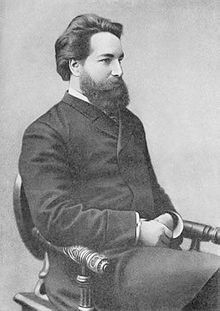
Sergei Sergeyevich Korsakov (Russian: Серге́й Серге́евич Ко́рсаков; 22 January 1854, Gus-Khrustalny – 1 May 1900, Moscow) was a neuropsychiatrist from the Russian Empire, known for his studies on alcoholic psychosis. His name is lent to the eponymous Korsakov's syndrome and Wernicke–Korsakoff syndrome.
Early life and education
Sergei Korsakov was the first great Russian neuropsychiatrist. He studied medicine at the Moscow State University, graduated in 1875 and subsequently became a physician at the "Preobrazhenski" (Russian: Преображенский) mental hospital.
From 1876 to 1879, he gained postgraduate experience in the clinic for nervous diseases under Aleksei Kozhevnikov. His thesis Alcoholic Paralysis gained him a medical doctorate in 1887.
-
 Ob alkogol’nom paraliche (Alcoholic Paralysis) - 1887
Ob alkogol’nom paraliche (Alcoholic Paralysis) - 1887
-
 Ob alkogol’nom paraliche (Alcoholic Paralysis) - 1887 - author's dedication
Ob alkogol’nom paraliche (Alcoholic Paralysis) - 1887 - author's dedication
Career
In 1892, Korsakov was appointed professor extraordinarius at a new university psychiatric clinic. During this time, he visited Vienna, where he was a pupil of Theodor Meynert. He was ordinarius of neurology and psychiatry from 1899 until his death the next year. He died from heart failure at the age of 46.
Legacy
Korsakov was one of the greatest neuropsychiatrists of the 19th century and published numerous works in neuropathology, psychiatry, and forensic medicine. Apart from his studies on alcoholic psychosis, he introduced the concept of paranoia and wrote an excellent textbook on psychiatry published in 1893. Additionally, he was a proponent of the non-restraint treatment in psychiatry. Korsakov studied the effects of alcoholism on the nervous system and drew attention to several cases of alcoholic polyneuropathy with distinctive mental symptoms (Korsakov's syndrome).
An able organiser, Korsakov was instrumental in founding the Moscow Society of Neuropathologists and Psychiatrists. The Zhurnal nevropatologii i psikhiatrii imeni Korsakova (Russian: Журнал невропатологии и психиатрии имени Корсакова, Korsakov Journal of Neurology and Psychiatry) was named after him.
According to a study conducted in 2015, Korsakov was included in "Russia team on medicine". This list includes fifty-three famous Russian medical scientists from the Russian Federation, the Soviet Union, and the Russian Empire who were born in 1757—1950. Physicians of all specialities listed here. Among them Vladimir Bekhterev, Vladimir Demikhov, Ivan Pavlov, Nikolay Pirogov, Victor Skumin.
Associated eponyms
- Korsakov's syndrome: Amnestic-confabulatory syndrome with three salient features (1) severe memory defect, especially for recent events; (2) confabulation (i.e., falsification of memory in an alert, responsive individual); and (3) polyneuropathy (psychosis polyneuritica), usually associated with alcoholism and malnutrition.
- Wernicke-Korsakov syndrome or Polioencephalitis haemorrhagica superior associated with Korsakov's psychosis: A condition characterized by nystagmus, ocular and Conjugate gaze palsy, ataxia and psychosis due to nutritional deficiency, more specifically of thiamine and observed mainly, though not exclusively, in alcoholics.
Publications
- 1890 Eine psychische Störung combiniert mit multipler Neuritis (Psychosis polyneuritica seu Cerebropathia psychica toxaemica)
- 1890 Ueber eine besondere Form psychischer Störung, combiniert mit multipler Neuritis
References
- Vein, Alla (2009). "Sergey Sergeevich Korsakov (1854–1900)". J Neurol. 256 (10): 1782–1783. doi:10.1007/s00415-009-5289-x. PMC 2758215. PMID 19690905.
- Engmann, Birk: Nervenärzte. Deutsch-russische Wissenschaftsbeziehungen im 19. Jahrhundert auf den Gebieten Psychiatrie, Neuropathologie und Neurologie; ein biobibliographisches Lexikon. Shaker, Aachen 2018, ISBN 978-3-8440-5906-9
- Kessels, Roy P. C. (2010). "Korsakov Syndrome". The Corsini Encyclopedia of Psychology. onlinelibrary.wiley.com. doi:10.1002/9780470479216.corpsy0490. ISBN 9780470479216.
- "Сборная России по медицине" [Russia team on medicine]. Medportal.ru. 21 April 2015. Archived from the original on 21 November 2021. Retrieved 18 February 2023.
- "Сборная России по медицине" [Russia team on medicine]. Farm.tatarstan.ru. 21 April 2015. Archived from the original on 9 February 2022. Retrieved 18 February 2023.
Further reading
- Firkin, Barry G.; Whitworth, J. A. (2002). Dictionary of Medical Eponyms (2nd ed.). Boca Raton: Parthenon. ISBN 978-1-85070-333-4.